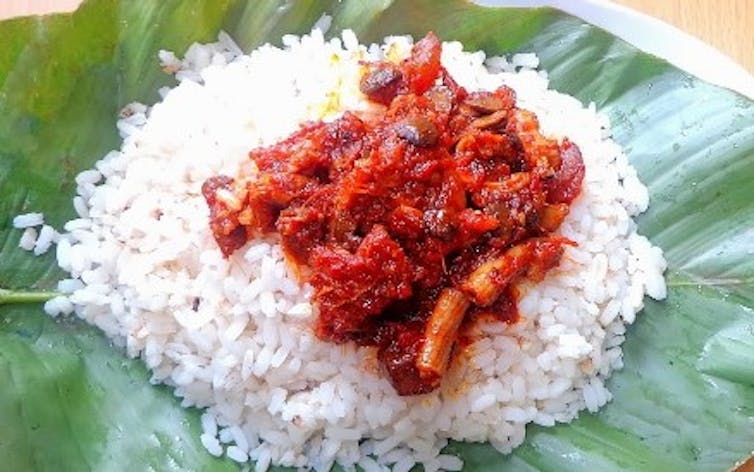
Street food is popular in Nigerian cities. Most of the local food delicacies are sold by vendors whose livelihoods depend on informal subsistence activities such as local food production and street food hawking. They are part of Nigeria’s vast informal sector, which accounts for 57.7% of the country’s economy.
But most food prepared by vendors has to be consumed within a short time to avoid spoilage. Refrigeration capacity is limited because of unreliable power supplies in the country.
The popularity of food sold by street vendors is part of a global shift in urban areas to “fast foods”. Most of the fast food in Nigerian cities is packaged in plastic bags. These are bad for the environment.
Leaves could be an alternative for packaging. But their use in cities has not been fully explored – so we studied the possibility and sustainability of using natural leaves as packaging material for traditional foods in Nigeria. Leaves are still used in the Nigerian countryside to package food.
We analysed academic literature as well as policy briefs and project documents from governmental and nongovernmental organisations. We found that leaf-type packaging material had several environmental advantages:
They are organic so they contain no artificial chemicals that can pollute the environment.
Their waste is easy to handle as they degrade fast.
Making them does not involve the use of energy, like burning of fossil fuels that could pollute the environment, unlike the production of synthetic packaging materials.
In the second part of our work we proposed a model that would help ensure the environmental sustainability of local food packaging materials. This model is based on the principle that good food packaging should protect food, be appealing, and preserve taste and nutrition. And there has to be a commitment to public health and environmental safety.
Considering that local food has been packaged in leaves since long ago in Nigeria, we concluded that there’s a strong case for reviving the use of natural leaf type packaging in the country’s cities.
Based on our research, we recommend that strong institutions and policies be put in place to oversee the local food industry. We believe that our work is critical in informing food, health and environmental policy decisions in Nigeria and other developing regions.
Alternative packaging
Our research involved looking at three phases of the leaf-type material used for food packaging in Nigeria. The first stage is when the leaf is sourced as the raw material for packaging; the second when it is used for packaging; and the final stage is when it is disposed of as garbage after use.
In rural areas, sources of green leaves for food packaging are backyard farms, nearby forests and bushes. People cultivate the source plant species close to their homes for convenience in daily use. These packaging materials are processed entirely naturally or organically.
But these materials are not abundantly available in urban areas. People living in towns and cities use discarded cans, old newspapers, foil, cellophane and polythene bags as substitutes.
There are special traditional types of Nigerian delicacies that are prepared, served and packaged using vegetable leaf wrappers. They include ogiri (spices), ukpaka (bean seed), akara (bean cake), agidi (corn cake) and fufu (cassava).

Green leaf packages prevent nutrients from being lost through evaporation or transpiration. They are easy to handle, making food distribution and transportation simple. And they protect food products from deterioration.
Environmentally, using vegetable leaves instead of synthetic packaging on a bigger industrial scale might cut down on carbon emissions. Used leaves also degrade quickly.
A model for use
Our circular economy concept has been developed as a possible way to achieve sustainability objectives. It seeks to ensure availability of local packaging materials in urban areas.
The proposed model would integrate stakeholders and activities in the value chain. It covers effective urban planning, proper waste resource management and wealth creation while considering social, political and economic realities typical to the developing world. The model explains the roles that all stakeholders, policies and institutions will play to make leaves abundantly available in cities while ensuring environmental sustainability.
For instance, while urban planning is concerned with tree-planting for aesthetics, using our model, the choice of trees could be those species that provide multiple functions.
The outcome shows that the green leaf packaging material for indigenous food items in Nigeria could work in terms of market viability and social acceptability.
What stands in the way
There is an urgent need for new regulations and better control of local food production, packaging and consumption in Nigeria. Two major factors inform this:
Many of Nigeria’s food processing facilities are still home-based or in cottage industries using rudimentary tools and procedures.
There is minimal consideration for good manufacturing practices and hygienic production processes. This leads to frequent chemical and microbial contamination.
We identified some solutions.
Food packaging requires investment in technology and innovation. This investment is missing in Nigeria.
We also believe that if the government creates adequate channels, nongovernmental and private organisations could salvage the situation. There have been cases where developmental organisations bypassed government institutions and worked directly with private sector organisations and nongovernmental organisations involved with vendors or street food marketers and others at the micro-economy level.
This support could be in the form of basic health, hygiene and safety education and providing them with equipment like gloves and disinfectants.
Obiora Ezeudu does not work for, consult, own shares in or receive funding from any company or organization that would benefit from this article, and has disclosed no relevant affiliations beyond their academic appointment.
This article was originally published on The Conversation. Read the original article.







